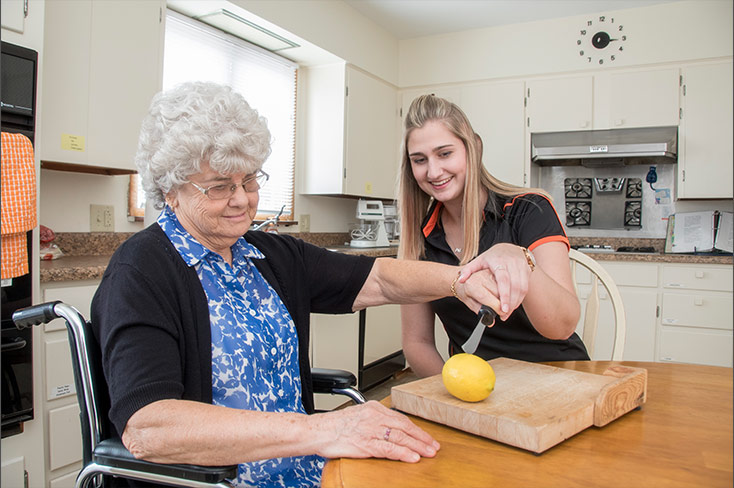We all have experienced fatigue. Fatigue is a normal response to exertion and activity. But what if fatigue negatively impacts your ability to get through the day? For some, chronic fatigue can be a significant barrier to functional performance and impede one’s quality of life.1
Energy conservation refers to the practice of reducing the amount of expended energy during a single task to prevent significant fatigue. Many of us use energy conservation techniques on a regular basis.1 One common technique is to use a shopping cart at the grocery store instead of carrying all your grocery items in your arms. This is a clear example of an activity that can be made more manageable with the use of equipment to decrease the effort required from the body during the task. Many of us use this technique because when we return from the grocery store, we want to have adequate energy to unload the groceries and carry on with the rest of our day.
If you are experiencing fatigue on a regular basis, occupational therapy can help you find ways to conserve your energy. One of the skills of an occupational therapist is to perform an activity analysis with individuals. An activity analysis takes an activity and breaks it down into its smaller components. It is like examining a cake, and then breaking it down into its various ingredients. A therapist can modify the smaller components to be less taxing, thus making the entire activity more efficient. The result is that you do not have to stop doing that activity because of fatigue, and instead, learn energy conservation techniques that keep you engaged in your favorite activities and limit your fatigue.
Here are some examples of ways to conserve energy with common tasks:
- Break big tasks into smaller pieces. When unloading the dishwasher, take all the plates out of the dishwasher and place them on the counter next to the dishwasher. Then move the plates from the counter into the cabinet.
- Plan rest breaks throughout the activity. During your morning routine, rest between getting dressed and grooming.
- Have a stool or a chair nearby to rest when completing standing tasks. If you are cooking soup for dinner, have a stool in the kitchen so you can sit between chopping the vegetables and heating the broth.
- Wear comfortable clothes. Wear button up shirts versus overhead shirts, dress in layers, and/or wear loose fitting pants with elastic waistbands.
This is a short list, but it illustrates the way an occupational therapist can help you conserve energy in your daily activities. For more information on how an occupational therapist can help you conserve energy, contact us today!

LYL Occupational Therapist
Dr. Michelle Messer has been an occupational therapist since 2010. She has clinical experience in many different settings and has also been an occupational therapy faculty member. Her passion is providing great occupational therapy interventions.
Dr. Messer acknowledges that every client she meets has unique needs, and it is her great honor and privilege to work side by side with each client to support them in achieving their goals. She has undergone advanced trainings and certifications to meet the needs of her clients. She is proud to be a Board Certified Practitioner in Physical Rehabilitation, a distinction achieved by one percent of occupational therapist clinicians nationwide.
Dr. Messer loves her profession and loves what the work of being an occupational therapist allows her to do. Her role, as an occupational therapist, is to help clients leverage their assets to improve function and quality of life. Knowing that everyone has areas that could benefit from continued development and growth, she loves helping clients to nurture those areas to being their total health and wellness into optimum capacity. She has found that when clients are supported in this journey, the sky is the limit, and it is so rewarding to facilitate and encourage during that journey.
References
1Pendleton, H. M., & Schultz-Krohn, W. (2018). Pedretti’s occupational therapy: Practice skills for physical dysfunction. St. Louis, MO: Elsevier.
What makes us different? Our care comes to you!
View Our Service AreaWe Are A Comprehensive Mobile Company Focused on Wellness, Fitness, Rehabilitation, and Prevention
We specialize in transforming the lives of seniors, adults and teenagers with a wide array of diagnoses and conditions in their home or location of choice. You deserve to be your best self through good health and wellness. We would love to have the privilege to work with you or a loved one.
Request a FREE Consultation Today!
